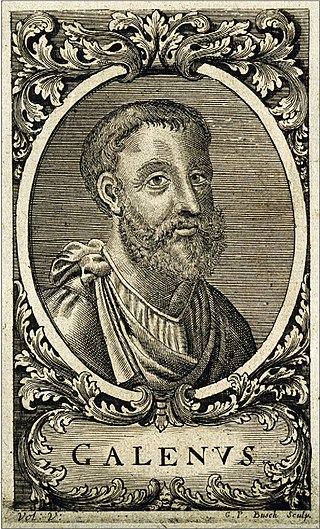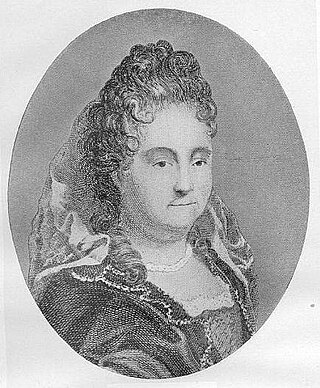Related Research Articles
Aedesius was a Neoplatonist philosopher and mystic. He was born into a wealthy Cappadocian family, but he moved to Syria, where he was apprenticed to Iamblichos. None of his writings have survived, but there is an extant biography by Eunapius, a Greek sophist and historian of the 4th century who wrote a collection of biographies titled Lives of the Sophists. Aedesius's philosophical doctrine was a mixture between Platonism and eclecticism and, according to Eunapius, he differed from Iamblichus on certain points connected with theurgy and magic.

Aelius Galenus or Claudius Galenus, often Anglicized as Galen or Galen of Pergamon, was a Greek physician, surgeon and philosopher with Roman citizenship. Considered to be one of the most accomplished of all medical researchers of antiquity, Galen influenced the development of various scientific disciplines, including anatomy, physiology, pathology, pharmacology, and neurology, as well as philosophy and logic.

Gilles Ménage was a French scholar.

Anne Le Fèvre Dacier, better known during her lifetime as Madame Dacier, was a French scholar, translator, commentator and editor of the classics, including the Iliad and the Odyssey. She sought to champion ancient literature and used her great capabilities in Latin and Greek for this purpose as well as for her own financial support, producing a series of editions and translations from which she earned her living. She was the dedicatee of Gilles Ménage's Historia mulierum philosopharum, whose characterisation of her and of Anna Maria van Schurman was used to provide leading examples in treatises arguing for female education across the following centuries.
Alcinous was a Middle Platonist philosopher. He probably lived in the 2nd century AD, although nothing is known about his life. He is the author of The Handbook of Platonism, an epitome of Middle Platonism intended as a manual for teachers. He has, at times, been identified by some scholars with the 2nd century Middle Platonist Albinus.

Alcmaeon of Croton was an early Greek medical writer and philosopher-scientist. He has been described as one of the most eminent natural philosophers and medical theorists of antiquity and he has also been referred to as "a thinker of considerable originality and one of the greatest philosophers, naturalists, and neuroscientists of all time." His work in biology has been described as remarkable, and his originality made him likely a pioneer. Because of difficulties dating Alcmaeon's birth, his importance has been neglected.
Antigenes was the name of a number of people of ancient Greece:

Polemon of Athens was an eminent Greek Platonist philosopher and Plato's third successor as scholarch from 314/313 to 270/269 BC. A pupil of Xenocrates, he believed that philosophy should be practiced rather than just studied, and he placed the highest good in living according to nature.
Crates of Tralles was an orator or rhetorician in the school of Isocrates.
Adrastus of Aphrodisias was a Peripatetic philosopher who lived in the 2nd century AD. He was the author of a treatise on the arrangement of Aristotle's writings and his system of philosophy, quoted by Simplicius, and by Achilles Tatius. Some commentaries of his on the Timaeus of Plato are also quoted by Porphyry, and a treatise on the Categories of Aristotle by Galen. None of these have survived. He was a competent mathematician, whose writings on harmonics are frequently cited by Theon of Smyrna in the surviving sections of his On Mathematics Useful for the Understanding of Plato. In the 17th century, a work by Adrastus on harmonics, Περὶ Ἁρμονικῶν, was said by Gerhard Johann Vossius to have been preserved, in manuscript, in the Vatican Library, although the manuscript appears to be no longer extant, if indeed this was not an error on Vossius' part.
Aegimus or Aegimius was one of the most ancient of the Greek physicians, who is said by Galen to have been the first person who wrote a treatise on the pulse. He was a native of Velia in Lucania, and is supposed to have lived before the time of Hippocrates, that is, in the 5th century BC. His work was entitled Περί Παλμων, which is no longer extant.
Aleuas or Alevas can refer to more than one person from ancient Greek myth and history:
Athenaeus of Attalia, was a physician, and the founder of the Pneumatic school of medicine. He was born in Cilicia, at Attalia according to Galen, or at Tarsus according to Caelius Aurelianus. He was the tutor to Theodorus, and appears to have practised medicine at Rome with great success.
Theudas of Laodicea was a Pyrrhonist philosopher and physician of the Empiric school, in the 2nd century. He is mentioned by Diogenes Laërtius as being a native of Laodicea in Syria, a pupil of Antiochus of Laodicea, and a contemporary of Menodotus. A physician of this name is also quoted by Andromachus.
Bolus of Mendes was a philosopher, a neopythagorean writer of works of esoterica and medicine, in Ptolemaic Egypt. Both the Suda, and a later work mistakenly attributed to Eudokia Makrembolitissa—Ἰωνιά; Bed of Violets, probably a 16th-century forgery by Constantine Paleocappa—write of a Pythagorean philosopher of Mendes in Egypt. He is described as one who wrote on marvels, potent remedies, and astronomical phenomena. The Suda, however, also describes a separate Bolus who was a philosopher of the school of Democritus, who wrote Inquiry, and Medical Art, containing "natural medical remedies from some resources of nature." However, from a passage of Columella, it appears that Bolos of Mendes and this other Bolus, follower of Democritus, were one and the same person. He seems to have lived following the time of Theophrastus, whose work Historia Plantarum, Bolus appears to have known.
The gens Arria was a plebeian family at ancient Rome, which occurs in history beginning in the final century of the Republic, and became quite prominent in imperial times. The first of the gens to achieve prominence was Quintus Arrius, praetor in 72 BC.
Criton of Heraclea was a 2nd-century Greek chief physician and procurator of Roman Emperor Trajan (98–117) in the campaign in Dacia. He is perhaps the Criton mentioned in Martial's Epigrams.
Abrotelia was a female Pythagorean philosopher. She was one of seventeen women included in Life of Pythagoras , written by Iamblichus. Abrotelia's father was Abroteles of Tarentum and she is thought to have been born in Tarentum. Iamblichus cited Abrotelia as one of the illustrious female Pythagorean philosophers, although her name was among the nine who were listed with names of their husbands or male family members. Some scholars such as Ethel Kersey identified Abrotelia as one of those who wrote or taught in traditional philosophical fields such as metaphysics, logic, and aesthetics, among others. She is also listed in Gilles Ménage's Historia Mulierum Philosopharum, which showed the Pythagorean school as the sect with the most number of female philosophers, with its adherents greater than the Platonic sect.
Antonius was a physician of ancient Greece. He was mentioned by the medical writer Galen, and referred to as "the herbalist". He must have lived in or before the first century.
Arria was a woman in ancient Rome of a prestigious family notable in political affairs -- though often on the bad side of the emperor -- throughout the first century CE.
References
- ↑ Galen, de Ther. ad Pison. 100.2. vol. ii. p. 485, ed. Basil
- ↑ Curnow, Trevor (2006). "Arria". The Philosophers of the Ancient World: An A-Z Guide. Bloomsbury Academic. p. 49. ISBN 9780715634974 . Retrieved 2023-05-03.
- ↑ Gilles Ménage, Historia Mulierum Philosopharum 100.47
![]() This article incorporates text from a publication now in the public domain : Smith, William (1870). "Arria (3)". In Smith, William (ed.). Dictionary of Greek and Roman Biography and Mythology . Vol. 1. p. 350.
This article incorporates text from a publication now in the public domain : Smith, William (1870). "Arria (3)". In Smith, William (ed.). Dictionary of Greek and Roman Biography and Mythology . Vol. 1. p. 350.